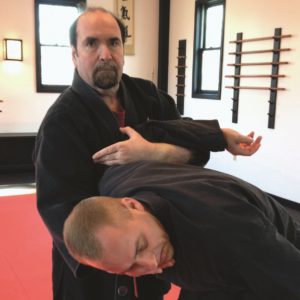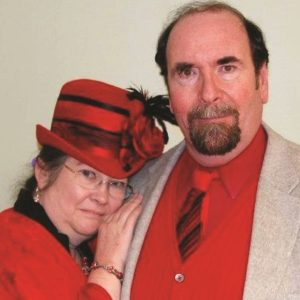By Kathie Ragsdale
When Lyndeborough attorney Joseph Caulfield takes on a case, he approaches it with the skills of a martial artist, and with a sprinkling of magic.
“The martial arts inform all my life,” says the legal practitioner of 40-plus years, who is also a highly ranked martial arts instructor and magician/mystery entertainer. “It enables me to function, enables me to overcome my shyness.”
Caulfield is the founder and chief instructor of Black Sword Aikido, a martial arts discipline that recommends “when force is presented against you, any aggressive action, you don’t butt heads against it, you join with it and lead it to a position of harmony,” he says. “That really infuses my practice of law.”
He sees that approach as particularly valuable in family law, which constitutes about 80 percent of his practice. Criminal cases make up most of the remainder.
“I try to do as little harm in the world as possible, and I think the way to resolve a situation, especially a family law situation, is through discussion, negotiation–each person having the opportunity to present their needs and try to resolve them,” he says. “Litigation is a horrible way to resolve anything; though it’s necessary if mediation fails.”
A certified guardian ad litem and certified family mediator, Caulfield is president of the New Hampshire Guardian Ad Litem Association and a founding member of the Academy of Professional Family Mediators.
He is also president of the Granite State Magicians and a member of the International Brotherhood of Magicians and performs at a variety of fundraisers and other events throughout the state.
That avocation, too, complements his legal work, Caulfield says.
“Anytime I’m in court is basically a performance,” he says. “The same stage presence, those are all things you use in the courtroom. I’m not minimizing the intellectual part of the law, but an awful lot is showmanship and stagecraft. There’s something more to being a lawyer than just knowing the law.”
A native of Norwood, Massachusetts, Caulfield was born to lawyer parents. His father was a Boston trial lawyer and one-time acting dean of Suffolk Law School, and his mother was what he calls a “Renaissance woman,” who started as a legal secretary before volunteering in World War II, getting her bachelor’s and master’s degrees and then going on to Suffolk Law School.
They discouraged him from becoming a lawyer, thinking “the time for lawyers was gone from this world,” Caulfield says; they suggested that he become a doctor instead. He entered a pre-med program at Boston College, but during his second year saw his father try a court case. “It enthralled me,” he remembers. He switched majors.
He received his juris doctor cum laude from Suffolk Law and practiced law briefly in downtown Boston. He later accepted a teaching position at Suffolk Law, where he became executive director of legal assistance, lecturing in family law practice and trial tactics. He ran a legal assistance program in Charlestown, often representing battered women from the inner city.
Caulfield then accepted an offer to become a partner at a New Hampshire law firm and worked at a few others before starting his own firm in 1982.
Attorney Brian Snow met Caulfield when both were practicing in Nashua District Court as young lawyers; the two have remained close since then. “He was a tough adversary at the time, and out of such adversity comes friendship,” Snow recalls. “He is an extremely talented lawyer, sometimes strident but very talented. He is also a marvelous magician and a martial artist, as well.”
The attraction to martial arts came early. Caulfield studied karate as a boy, then moved on to Aikido “to keep myself sane” in college. He later learned other martial arts forms before starting Black Sword Aikido.

“I think the martial artists who know how to defend themselves are the most peaceful people, because they don’t have to prove anything,” he says. “To me, it’s not just fighting: it’s doing the perfect technique.”
Jon Beyer has been a martial arts student of Caulfield’s for some 29 years. He believes in the approach where “what you try to do is remain calm and redirect, so you both get to a point of mutual respect, and it’s not conflict meeting conflict.”
“The reason I kept studying with [Caulfield] is, I thought he was one of the best martial artists I’ve seen, technically more advanced,” he adds. “I think he honestly cares about people; I really do. He cares about the common good.”
Caulfield’s interest in magic predates even his martial arts history. His grandfather, born in Ireland, was also a magician, and “he used to utterly amaze me as a kid doing magic tricks,” he says. One such trick involved taking Caulfield’s mother’s mink stole, repeating magic words over it, then “bringing it to life” so it would crawl across the floor and up the wall before settling to stillness again. (Only later did Caulfield learn his grandfather had taken thread from a sewing basket and roped it through the room to pull the stole along.)
Caulfield joined a Boston magic club as a boy and is now a member of the International Brotherhood of Magicians, Order of Merlin Excelsior, Society of American Magicians, and other magician associations.
He has graduated from what he calls “mainstream magic” (“where the magician approaches the audience and basically says ‘see how clever I am’”) to a style of magic called “mystery performing.” “It’s me and the audience revealing mysteries together,” he says. “[W]hen my audience leaves, I want them to have a moment of transcendence, and for one brief moment say, ‘maybe there is magic in the world.’”

Fellow magician Robert Granville has performed with Caulfield many times over the 10-plus years of their acquaintance and shares his philosophy on mystery entertainment. “Rather than seeking to amaze an audience with feats of the impossible, mystery entertainers prefer to create an atmosphere that takes the audience slightly out of its comfort zone to a place where bizarre and mysterious things can happen.”
Granville adds that Caulfield has been president of the Granite State Magic and Mystery Entertainers for several years. “Under his leadership, our club has performed numerous shows over the years, both as charitable donations where we take no fees, such as fundraisers for a local police department to fund its K-9 program and institutions that shelter at-risk children, as well as shows open to the public where the proceeds are used to cover the expenses of the club.”
Caulfield has tried more than 1,000 cases in the last 43 years, obtaining settlements in cases involving everything from exploding propane tanks and wrongful deaths to multi-vehicle collisions. But those are not the ones that stand out in his mind.
“If I try a murder case or a rape case, it’s over with, and I go on with my life. But the cases that linger for me are these cases where I‘m a guardian ad litem,” he says. “Years later, I lie awake at night wondering if I made the right decision. Those are the cases that linger and bother me.”
So, it is especially gratifying to him when a parent contacts him years later to thank him for his handling of a case or when someone calls to say, “you were my guardian ad litem, and now I’m in college.”
“It’s important to do as little harm in this world as you can,” Caulfield adds. “Sometimes, you have to do harm. But even when you have to do harm – be it physical or emotional or legal – you should do as little as possible. I don’t think you should try to crush anybody. When you do violence in the world, you really do violence to yourself.”
